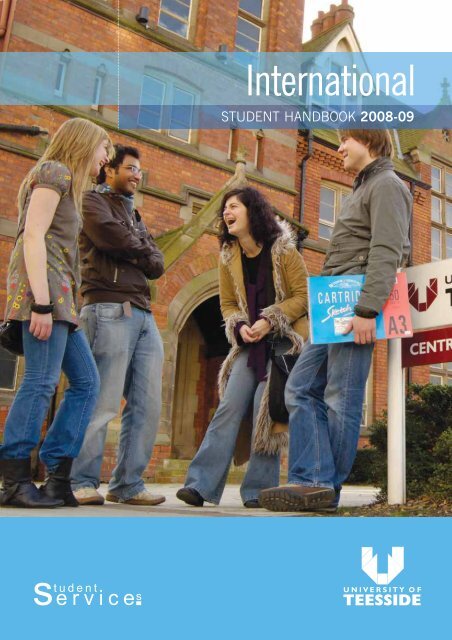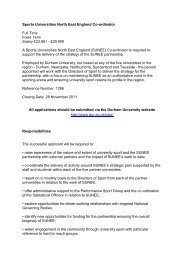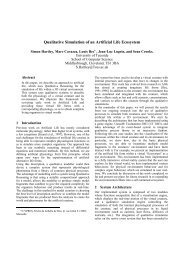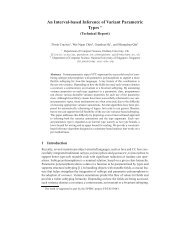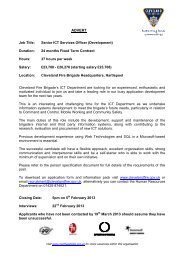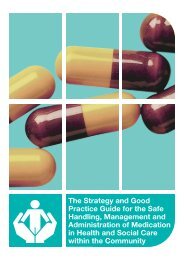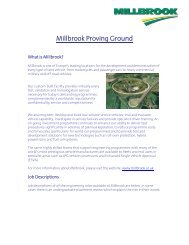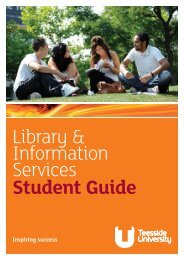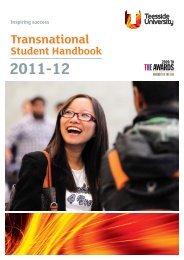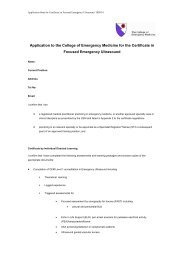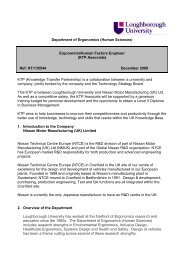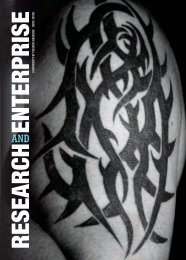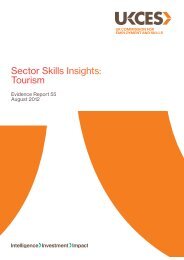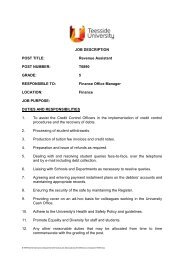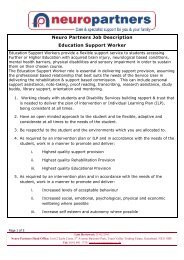International - University of Teesside
International - University of Teesside
International - University of Teesside
Create successful ePaper yourself
Turn your PDF publications into a flip-book with our unique Google optimized e-Paper software.
CONTENTS1 INTRODUCTION AND UNIVERSITY OF TEESSIDE CONTACTS 6Contact list for enquiries 62 IMMIGRATION 7Before you arrive – a brief check list 7Immigration requirements 7Applying for entry clearance 7Tuberculosis (TB) screening 8Extending your permission to stay in the UK 8Staying in the UK to seek work 9Police Registration 9Visiting the United States during studies 93 FINANCE – FEES AND FUNDING 10<strong>International</strong> tuition fees 2008-09 10Payment <strong>of</strong> a deposit 10Refund <strong>of</strong> a deposit 10Payment <strong>of</strong> fees 10<strong>International</strong> bursary scheme 10Prompt payment discount 10Progression to a master’s degree 10Physiotherapy/occupational therapy/radiography courses 10‘Home’ and European Union national fee rates 11Financial support for undergraduate European students 11Living costs while studying 11Living arrangements 12Sources <strong>of</strong> funding 13Money and banking 14Banks and bank accounts 15CONTENTS 3
6 HEALTH CARE 28Preparing for the British climate 28Looking after yourself 28Registering with a GP (doctor) 29Dental care (caring for your teeth) 307 EMPLOYMENT AND PLACEMENTS 31European students 31Non-EEA students 31Student Job Centre 32National minimum wage 32Legal limits 328 USEFUL ADDRESSES AND TELEPHONE NUMBERS 33Advice and information services 33Useful addresses on <strong>Teesside</strong> 339 INDEX 35CAMPUS MAPBACK COVERCONTENTS 5
IMMIGRATIONBefore you arrive –a brief check list• Obtain entry clearance/visa (if necessary). Carry allrelevant documentation with you for when you arrivein the UK.• Make sure you have arranged enough money to coveryour stay.• If you are from outside the European Economic Area(EEA) and are here for less than six months, arrangeprivate medical insurance.• If you are in <strong>University</strong> accommodation, make sure youhave confirmed your place and returned all documents.• Make firm travel arrangements.• Register for the Orientation Programme.Immigration requirementsEEA COUNTRIESThose who have right <strong>of</strong> abode in the UK or nationals<strong>of</strong> the EEA/Switzerland do not need a visa or entryclearance. EEA countries are Austria, Belgium, Bulgaria,Cyprus, Czech Republic, Denmark, Estonia, Finland, France,Germany, Gibraltar, Greece, Hungary, Iceland, Ireland, Italy,Latvia, Liechtenstein, Lithuania, Luxembourg, Malta,Netherlands, Norway, Poland, Portugal, Romania, Slovakia,Slovenia, Spain and Sweden.NON-EEA COUNTRIES: VISAS ANDENTRY CLEARANCEAll nationals <strong>of</strong> non-EEA member states who wish to cometo the UK for more than six months need to obtainentry clearance from a British consulate before travelling.Passengers arriving in the UK without entry clearance will berefused entry. You will need to apply for a student visa orprospective student visa. You should not apply to come tothe UK as a ‘visitor’ if you intend to study after arrival.Useful websites: www.bia.home<strong>of</strong>fice.gov.uk,www.ukvisas.gov.uk.Some nationals need a visa if they are in the UK for lessthan six months. Contact your nearest British embassy tocheck if you need a visa.Please note, the permit is ‘not transferable’, which meansit does not allow residence in other EU member countries.Please note, if you are not sure <strong>of</strong> the type <strong>of</strong> visa orentry clearance you need, you should contact your nearestBritish Embassy or High Commission for advice.Applying for entry clearanceYour nearest British Embassy or High Commission will adviseyou on appointments, visa processing times and procedures(see www.ukvisas.gov.uk).Students and their dependants will need to complete formVAF3 (which is free) and can be found on the UKvisaswebsite. You will need to provide the following documentsto show that you meet the Immigration Rules for students:• a letter from the <strong>University</strong> confirming that you haveaccepted an unconditional <strong>of</strong>fer for a full-time course, orperiod <strong>of</strong> research, at the <strong>University</strong> <strong>of</strong> <strong>Teesside</strong> (we areincluded on the Register <strong>of</strong> Education and TrainingProviders); and• you have enough money to cover your living costs andfees, and those <strong>of</strong> any dependants living with you in theUK, without needing to work or apply for public funds:- if you are being sponsored by a relative or friend, youwill need a letter confirming this and the sponsor willneed to show that they have the funds to cover thisadditional expense. Evidence must be in the form <strong>of</strong>original documents: bank statements, payslips, bankloans or savings accounts,- if you are sponsored by a government agency, you willneed a letter confirming how long the sponsorship willcontinue and what costs will be covered,- iIf you are paying your own costs from savings, you willneed original bank statements covering at least threemonths;• any certificates that are relevant for the course you wishto study; and• evidence that you intend to leave the UK at the end <strong>of</strong>your period <strong>of</strong> study.This could be evidence that youhave a spouse or children who will remain at homewhile you study, a house in your own country orconfirmation <strong>of</strong> a job being held for you on return.You will need to pay a fee which is the local equivalent <strong>of</strong>£99, for each person applying for entry to the UK.If you experience any difficulties with thisprocess, please email the <strong>International</strong> StudentAdvisers on international@tees.ac.uk or call+ 44 (0) 1642 342277 or fax + 44 (0) 1642 342289.IMMIGRATION 7
RESEARCH-ONLY STUDENTSCurrently, none <strong>of</strong> the <strong>University</strong> <strong>of</strong> <strong>Teesside</strong>’s taughtpostgraduate courses require an ATAS certificate. However,if you are a non-EU/EEA (including Switzerland) studentundertaking research in one <strong>of</strong> the disciplines listed belowand which carries a relevant JACS code, you will need tohold a valid Academic Technology Approval Scheme (ATAS)clearance certificate from the Counter-ProliferationDepartment <strong>of</strong> the Foreign and Commonwealth Officewhich relates to the course, or area <strong>of</strong> research, you intendto take. Details can be found at www.fco.gov.uk, type ATASinto the search box.Biological SciencesJACs codes beginningC1 BiologyC2 BotanyC4 GeneticsC5 MicrobiologyC7 Molecular Biology,Biophysics andBiochemistryC9 Others in BiologicalSciencesPhysical SciencesJACs codes beginningF1 ChemistryF2 Materials ScienceF3 PhysicsF5 AstronomyF8 Physical and TerrestrialGeographical andEnvironmental SciencesF9 Others in PhysicalSciencesMathematical andComputer SciencesJACs codes beginningG1 MathematicsG2 Operational ResearchG4 Computer ScienceG7 Artificial IntelligenceG9 Others in Mathematicaland Computing SciencesEngineeringJACs codes beginningH1 General EngineeringH2 Civil EngineeringH3 Mechanical EngineeringH4 Aerospace EngineeringH5 Naval ArchitectureH6 Electronic and ElectricalEngineeringH7 Production andManufacturingEngineeringH8 Chemical, Process andEnergy EngineeringH9 Others in EngineeringTechnologiesJACs codes beginningJ2 MetallurgyJ4 Polymers and TextilesJ5 Materials Technology nototherwise specifiedJ7 Industrial BiotechnologyJ9 Others in TechnologyTuberculosis (TB) screeningNationals <strong>of</strong> the following countries will need to haveevidence from an accredited clinic that they are free frominfectious TB if they are coming to the UK for more thansix months: Bangladesh, Ghana, Kenya, Pakistan, Sudan,Tanzania and Thailand (including Cambodia and Laos).Payment for screening is made in US dollars and will rangefrom about US$50 to US$70.If a certificate is not produced, entry clearance will normallybe refused.You can find more information from your nearest BritishEmbassy/High Commission or on www.ukvisas.gov.uk.Extending your permissionto stay in the UKThe majority <strong>of</strong> non-EEA students should be givenpermission to remain in the UK for the length <strong>of</strong> theircourse plus four months by the entry clearance <strong>of</strong>ficer inthe British Consulate in their own country. If the full amount<strong>of</strong> time is not given, please contact the <strong>International</strong> StudentAdvisers immediately. They may be able to get the length <strong>of</strong>stay corrected.Leave that expires before the end <strong>of</strong> a course will need tobe extended by applying to the Home Office by post or inperson. Applications to stay longer must be made beforethe current leave to remain expires, ie before the datestamped in your passport. You need to complete the HomeOffice form FLR(S) which is available from the <strong>International</strong>Student Advisers in the Student Centre or from theStudents’ Union Advice Centre, or it can be downloadedfrom www.bia.home<strong>of</strong>fice.gov.uk.You must send the following documents, along withthe completed form to the Home Office at the givenaddress inside the FLR(S) form:• payment (currently £295 for postal applications and£500 for in-person applications)• your unexpired passport or travel documents• two passport-sized photographs with your name onthe reverse• your police registration documents (if applicable)• evidence <strong>of</strong> relevant examinations taken, or progresson current or recent courses (if applicable)• evidence <strong>of</strong> satisfactory attendance during your recentcourse (in the form <strong>of</strong> a letter from your school orprevious institution)• evidence <strong>of</strong> enrolment on the course on which youare seeking leave to remain• your bank statements covering the last three months8 INTERNATIONAL STUDENT HANDBOOK
• wage slips for the last three months <strong>of</strong> term timeemployment (if applicable)• if you have guaranteed part-time work at yourinstitution, an original letter confirming this• a letter confirming your current sponsorship, or thata former sponsoring authority consents to yourcontinued study in the UK• a letter from your relative or friend confirming thatthey are willing to provide you withaccommodation/finance (if applicable).IN-PERSON APPLICATIONSThese can be made at Public Enquiry Offices (PEOs) aroundthe country. All the above documentation will need to beprovided, along with a fee <strong>of</strong> £500. You need to call the PEOyou wish to visit in advance to make an appointment.HELP AND ADVICEForms, advice and assistance with extending or changingleave to remain, and other immigration matters, are availablefrom the <strong>International</strong> Student Advisers in the StudentCentre. They are normally able to check and submitapplications through the student batch system, which tendsto be faster and more reliable than individual applications.Payment is by postal order, which incurs a small charge.Students should make an appointment at least four weeksbefore their visa expires by calling into the Student Centrereception or by telephoning 01642 342277.Students already on courses in the UK may wish to apply forentry clearance if they are out <strong>of</strong> the UK and only have alimited amount <strong>of</strong> leave left. The £99 charged for entryclearance at posts abroad is far cheaper than the cost <strong>of</strong>extending leave to remain from within the UK. They willrequire a letter from their School confirming their progressand attendance on the course, including start and finishingdates.Staying in the UK to seek workGraduates may apply for a one-year work permit on the<strong>International</strong> Graduate Scheme (IGS) within one year <strong>of</strong>completing their course. For more information see thebooklet Succeeding at <strong>Teesside</strong> (details on page 27).Further details will be available from the <strong>International</strong>Student Advisers and atwww.bia.home<strong>of</strong>fice.gov.uk/workingintheuk.Police RegistrationYour passport stamp will tell you whether you need toregister with the police. Students from the EEA orCommonwealth should not have to register, but checkyour passport to make sure.If you are required to register, you must do so withinseven days <strong>of</strong> your arrival in the UK.The charge is currently £34 for registration and you willneed this when you register, plus your passport, a passportsizedphotograph and any other documents the HomeOffice or embassy issued to you. In Middlesbrough, youshould ring 01642 301330 to make an appointment.Alternatively, the <strong>International</strong> Student Advisers in StudentServices may be able to arrange registration sessions at the<strong>University</strong>.Registration with the police must be renewed each timeyou change address, course, passport or have your leaveto remain in the UK extended. It does not cost you torenew your registration.Failure to register with the police, if required to do so, is acriminal <strong>of</strong>fence and could lead to prosecution. You shouldcarry your Police Registration Certificate at all times and itmust be produced to a police <strong>of</strong>ficer or an immigration<strong>of</strong>ficer on request.Visiting the United Statesduring studiesIt is <strong>of</strong>ten difficult for international students who wish totravel to the US for vacations and family visits during theirUK studies to obtain a non-immigrant US visa. This isbecause international students <strong>of</strong>ten cannot demonstratestrong enough ties to the UK to satisfy the US visaauthorities that they will leave the US at the end <strong>of</strong>their visit.If you know that you may want to visit the US during yourUK studies, you are advised to apply for a US visa in yourown country before coming to the UK. A successfulapplication in your own country, even if it is no longervalid when you wish to travel, should assist you in a furtherapplication for a US visa.IMMIGRATION 9
FINANCE – FEES AND FUNDINGBefore you come to the UK you must ensure that you haveenough money to pay for your full course fees and livingexpenses, and to support any dependant relatives you bringwith you. This is a requirement <strong>of</strong> immigration that appliesto all students, both EEA and non-EEA nationals. Financialassistance is rarely available to those who arrive withoutsufficient funds.This section is intended as a guide to how muchinternational students may need, but it cannot take intoaccount all possible additional requirements.<strong>International</strong> tuition fees 2008-09Tuition fees for undergraduate and postgraduate degrees:Undergraduate:• Classroom-based study £8,000• Laboratory-based study £8,500Postgraduate:• Classroom-based study £8,250• Laboratory-based study £8,750• MBA £11,000• Placement year £790Payment <strong>of</strong> a depositIf you are an international student coming to the <strong>University</strong><strong>of</strong> <strong>Teesside</strong> for the first time, you may have to pay a depositon your fees before you are given an unconditional <strong>of</strong>ferletter. Details <strong>of</strong> any deposit payable will be sent to youin your conditional <strong>of</strong>fer letter. Payment <strong>of</strong> a deposit candemonstrate to an Entry Clearance Officer that you havea serious intention to study and help with the issue <strong>of</strong> yourvisa. As soon as a deposit has been received by the<strong>University</strong> an <strong>of</strong>ficial receipt will be issued and sent out toyou. You can arrange to have your receipt delivered to youby courier but the cost <strong>of</strong> this service will be recharged toyour account. See the section on Money and Banking onpage 14 for details on making a payment.Refund <strong>of</strong> a depositThe deposit will be refunded if your visa is refused.You must provide us with a copy <strong>of</strong> the refusal andreturn the original <strong>of</strong>fer letter. If the <strong>University</strong> cancelsthe programme, you will be given a full refund.If you fail to enrol or withdraw in the first term, the<strong>University</strong> will retain one third <strong>of</strong> the tuition fee. If youarrive and then wish to defer to a later session, this will betreated as failure to enrol and one third <strong>of</strong> the tuition feewill be retained by the <strong>University</strong>.If you withdraw after the start <strong>of</strong> the second term, the<strong>University</strong> will retain the entire fee.If you have genuine documented reasons for withdrawingthen these will be considered by a fees panel.Payment <strong>of</strong> fees<strong>International</strong> students are required to pay 50% <strong>of</strong> theirannual tuition fee on registration with the <strong>University</strong>. If youhave already paid a deposit, this will be deducted from the50%. Students who do not pay 50% <strong>of</strong> their fees prior toor at enrolment will not be enrolled by the <strong>University</strong>.The balance may be paid by a variety <strong>of</strong> flexible paymentmethods. For details <strong>of</strong> these schemes for fees andaccommodation, telephone the <strong>University</strong> FinanceDepartment on +44 (0) 1642 342171 or emailfinance@tees.ac.uk.<strong>International</strong> bursary schemeThe <strong>University</strong> <strong>of</strong> <strong>Teesside</strong> is <strong>of</strong>fering an <strong>International</strong>Bursary <strong>of</strong> £1,500 a year to all independent students payingthe full international fee. This is automatically deducted fromthe fees in the first year. Bursary allocation for subsequentyears <strong>of</strong> your course will be automatic if you do not haveany outstanding debt with the <strong>University</strong> and you havesuccessfully progressed on to the next year <strong>of</strong> your course.Prompt payment discountThe <strong>University</strong> is prepared to <strong>of</strong>fer you a further discount<strong>of</strong> 5% <strong>of</strong>f the remaining element <strong>of</strong> your tuition fees,provided you have paid such fees in full to the <strong>University</strong>on or before enrolment.Progression to a master’s degreeIf you stay on after your first degree to progress to amaster’s degree, you will be given a discount <strong>of</strong> £1,000.Physiotherapy/occupationaltherapy/radiography coursesStudents on these courses may incur additional feesassociated with their particular course. Students shouldcheck the full extent <strong>of</strong> fees payable with the <strong>University</strong>’sFinance Department. Contact them by emailingfinance@tees.ac.uk.10 INTERNATIONAL STUDENT HANDBOOK
APPROXIMATE COSTSWEEKLY ANNUAL£ £Fees (see page 10) -Travel to the <strong>University</strong> from port <strong>of</strong> entry (see pages 16 to 20) -Accommodation (see accommodation brochure)Possessions insurance, depending on cover: halls <strong>of</strong> residence - 16.00-82.00Possessions insurance, depending on cover: other accommodation - 68.00-210.00Personal computer insurance (from £2/£100 insured)Heat, light and water rates (if not included in rent) 18.00Food and drink 30.00Cleaning, laundry etc 5.00Mobile/landline phone (depending on usage) 8.00TV rental (average) 3.00TV licence 131.50Daily travelClothing and personal hygiene 10.00Books and equipment (average – depends on course) 10.00Sport and leisure 10.00Police registration (if applicable – see page 9) 34.00Childcare (if applicable) 40.00Sub total <strong>of</strong> weekly costs, multiplied by weeks <strong>of</strong> residenceSub total <strong>of</strong> annual costsTotal estimated requirementLiving arrangementsDetails <strong>of</strong> your accommodation allocation will be sent to you separately. Email accommodation@tees.ac.ukwith any queries.12 INTERNATIONAL STUDENT HANDBOOK
Sources <strong>of</strong> fundingSTUDENT FUNDINGSome undergraduate students who have been resident fora number <strong>of</strong> years in the UK can receive Student Supportthat assists towards the cost <strong>of</strong> fees, and a Student Loanto help towards living costs.To qualify, you must:• have been ordinarily resident in the UK for three yearsup to 1 September before the beginning <strong>of</strong> yourcourse (if it begins in the autumn), and• not have been resident wholly or mainly because youwere receiving full-time education, and• have 'settled' status, (ordinarily resident in the UKwithout any time restriction on your stay under theimmigration rules) and• be attending a complete course designated formandatory awards purposes, and• not previously have received UK government fundingfor more than one academic year for any course <strong>of</strong>higher education <strong>of</strong> two or more years, and• apply within four months <strong>of</strong> the beginning <strong>of</strong> yourcourse, (before 31 December for courses beginningin the autumn).SCHOLARSHIPSSome scholarships are available to students. Most <strong>of</strong> theseare made by the British government to certain othergovernments and, in most cases, you must apply from yourown country before coming to study in the UK and <strong>of</strong>tenwell in advance <strong>of</strong> the course beginning.To get information about these, you should contact yourown Ministry <strong>of</strong> Education, which will have details <strong>of</strong> mostschemes, or the nearest British Council <strong>of</strong>fices, BritishEmbassy or High Commission. The address <strong>of</strong> the BritishCouncil in your home country can be found atwww.britishcouncil.org/home-contact-worldwide.If the British Council does not have an <strong>of</strong>fice in your homecountry, you are not eligible for British Council funding. Youshould contact the British Embassy or High Commission inyour country <strong>of</strong> origin at www.britishembassy.gov.uk.Other useful websites giving course and funding informationare:Education UK: www.educationuk.orgProspects (Graduate Careers Website):www.prospects.ac.ukThe Council for <strong>International</strong> Education UKCISA:www.ukcisa.org.ukSee also www.support4learning.org.uk click on Money,Financial Support for Overseas Study andwww.britishcouncil.org/learning-study-in-the-uk.These organisations will also be able to provide you withadditional information about studying abroad and living inBritain.UNIVERSITY OF TEESSIDEINTERNATIONAL BURSARY SCHEMEFor more information about the scheme, see page 10.UNIVERSITY OF TEESSIDESPORTS BURSARY SCHEMEFor more information, see page 25.SCHOLARSHIPS AWARDED BY THEBRITISH GOVERNMENTCommonwealth Scholarship and Fellowship Plan(CSFP)These are to help Commonwealth students and academics<strong>of</strong> high intellectual calibre to study in other Commonwealthcountries. They are primarily awarded to postgraduate andresearch students. Undergraduate or non-degree coursesare only considered in special circumstances. Applicantsshould be resident in their own country when applying.For details contact The Commonwealth ScholarshipCommission at The Association <strong>of</strong> CommonwealthUniversities, www.acu.ac.uk.The Sino-British Scholarship SchemeThis is for students in the People's Republic <strong>of</strong> China whoare resident in China at the time <strong>of</strong> application. Awards arefor postgraduate study in the UK. Applications arechannelled through the State Education Commission inBeijing. Apply to your home institution or work unit.Universities UK Overseas Research StudentsAwards Schemes (ORSAS)ORSAS funding is subject to review for 2008-09. Checkwww.findaphd.com for research opportunities.British Marshall ScholarshipsAwards are open to United States citizens under 26 years <strong>of</strong>age who are graduates <strong>of</strong> US universities. Awards coverfares, tuition fees, maintenance, books, thesis and travelallowances. About 40 new awards are available every year.The awards are publicised in US universities. BritishConsulates in the US have details or seewww.marshallscholarship.org.FEES AND FUNDING 13
OTHER SOURCES OF FUNDINGEuropean Community SchemesSome grants exist to promote exchanges <strong>of</strong> students andacademic staff within Europe, such as the SOCRATES,LEONARDO and MARIE CURIE (research) programmes.The European Commission also makes some awards tostudents from developing countries.For information contact the European Commission in yourown country, or visit www.europa.eu.int.Another source <strong>of</strong> EU funding information iswww.eurodesk.org.<strong>International</strong> AgenciesSome international organisations such as UNESCO andWHO operate schemes, usually for developing countries.For further information contact your own ministry <strong>of</strong>education.Voluntary OrganisationsVoluntary organisations, such as religious bodies andcharities, sometimes award scholarships.Contact the appropriate organisations in your own country.The British Council Scholarships DatabaseThe British Council now has a searchable online database<strong>of</strong> possible scholarships. This can be found atwww.educationuk.org/scholarships.Additional information on funding can be located atwww.britishcouncil.org click on Funding your Studies.Money and bankingBRITISH CURRENCY – COINS ANDNOTESThe unit <strong>of</strong> currency in the UK is the pound sterling (£).It is divided into 100 pence (100p). The coinage issued is 1p,2p, 5p, 10p, 20p, 50p, £1.00 and £2.00. The notes arein denominations <strong>of</strong> £5.00, £10.00, £20.00 and £50.00.TRANSFERRING MONEY TO THE UKTo pay a deposit before you come or make direct payment<strong>of</strong> your fees or accommodation, payment is accepted bythe <strong>University</strong> in the form <strong>of</strong> a bank transfer or, if you haverelatives in the UK who can pay your deposit, a payment ona UK credit/debit card/cheque.Our bank details are set out below should you need toeffect a bank transfer:Barclays Bank28/32 Albert RoadMiddlesbroughTees ValleyTS1 1QDUKAccount Name: <strong>University</strong> <strong>of</strong> <strong>Teesside</strong> Income AccountAccount Number: 10288500Sort Code: 20-56-78SWIFT Code: BARCGB22When making a payment please state your enrolmentnumber or UCAS number if known. This will help us toallocate your payment efficiently. You must also remember toconsider the current exchange rate when making apayment.If you have any queries regarding fee payment then pleasecontact the Finance Department at finance@tees.ac.uk.PERSONAL MONEYThere are several methods <strong>of</strong> transferring money to the UK:Mail Payment Orders (Mail Transfers)Mail transfers rely on the postal service and there is adanger that they may get lost between banks.Electronic TransferThis is safer than the first option as the instructions fortransfer pass between banks by cable or telex. This optioncan be more expensive than the first.Banker's DraftThis is a reliable, if slow, method <strong>of</strong> transfer. Your own bankcan issue a banker's draft, which is sent on to you to cash inthe UK. However, it may take up to 28 days to clear suchdrafts and you may need to have another source <strong>of</strong> moneyto cover you in the short term, eg traveller's cheques.Please remember that, before such transactions can takeplace, the appropriate amount <strong>of</strong> money must be in theremitting account in your home country. If you are beingsponsored, please check that your sponsor has made thenecessary arrangements.Foreign Exchange ControlsSome countries apply an upper limit to the amount <strong>of</strong>currency that may be converted in any one year and youare advised to check with your bank to see what, if any,restrictions apply long before you make arrangements totravel. Formal written evidence <strong>of</strong> enrolment, course feesand supporting documentation will be required in suchcountries. Some will also require written advice onrecommended living expenses.14 INTERNATIONAL STUDENT HANDBOOK
Banks and bank accountsMost <strong>of</strong> the major banks in Middlesbrough will openan account for full-time international students at the<strong>University</strong> on courses <strong>of</strong> a year or longer, if you canprovide the following documents:• your valid passport or EU identity card, and• UCAS or <strong>of</strong>ficial <strong>University</strong> <strong>of</strong>fer letter addressed toyour home address, and• the latest bank statement from your home bank, and• a document confirming your local address duringyour studies (see below).Pro<strong>of</strong> <strong>of</strong> local address – students in <strong>University</strong>managedaccommodationStudents who have taken a place in accommodationarranged by the <strong>University</strong> can request a letter from theStudent Centre Reception after their arrival in the UK.You must bring your passport or EU identity card with you.Pro<strong>of</strong> <strong>of</strong> local address – students in private-sectoraccommodationStudents in privately-rented accommodation may have towait to provide their bank with a household bill (gas,electricity or telephone) to prove their local address, beforethe bank can fully open their account. Tenancy agreementsare not usually accepted. As a bill may take up to severalweeks to be issued, students in private houses/flats shouldbring sufficient money in the form <strong>of</strong> traveller’s cheques, orensure that they have a good balance on their credit/debitcard, to meet their living costs over that period.BANK ACCOUNTSStudents are recommended to check what facilities themajor banks can <strong>of</strong>fer, as different banks <strong>of</strong>fer differing levels<strong>of</strong> facilities, depending on the way your funding is organised.On production <strong>of</strong> the documents listed, most banks can<strong>of</strong>fer a basic bank account to non-UK nationals. This meansthat the account must remain in credit at all times and that itwill allow standing orders and direct debits to be used forregular payments for goods and services. They can be usefulin helping you manage your money effectively. The accountmay also provide a cash card to use in ATMs/cash points.This will enable you to draw cash from your account,outside <strong>of</strong> normal banking hours, by using the cashpoint/dispensing machines, which can usually be foundoutside most branches <strong>of</strong> the major banks.There is an HSBC cash dispenser (ATM) at the <strong>University</strong>main entrance and in the Students' Union.Banks will not usually grant credit cards and loans tointernational students. Some <strong>of</strong>fer other facilities such asa debit card, cheque book, Visa card, savings accounts andother schemes to students who meet certain eligibilitycriteria. Charges may be made for such facilities and youmay have to keep a minimum balance.Please note, UK bank accounts are rarely open to studentswhose stay in the UK is for less than one year.Please note, do not carry large amounts <strong>of</strong> cash with you.Instead, use traveller’s cheques or a credit card.The main banks have branches in all towns. It is convenientto open an account with a bank near to your place <strong>of</strong> study.Banking hours vary, but most open at 9.30am. Most majorbanks have branches that open on a Saturday morning.Middlesbrough BanksLloyds TSB Bank137 Albert Road Tel: 0845 3000000Outside UK: +44 (0) 1624 638000Barclays169 Linthorpe Road Tel: 08457 555555Outside UK: +44 (0) 1202 648921HSBC60 Albert Road Tel: 0800 032 4738Outside UK: +44 (0) 1442 421016NatwestThe Mall,106 Linthorpe Road Tel: 0845 3066581Outside UK: +44 (0) 121 6351592Royal Bank <strong>of</strong> Scotland (RBS)22 Albert Road Tel: +44 (0) 1642 225626You should ask your bank to send you regular (usuallymonthly) statements, which you should keep asdocumentary evidence for the renewal <strong>of</strong> your student visa.BUILDING SOCIETIESThese <strong>of</strong>fer services for people with money to save, <strong>of</strong>ten atfavourable interest rates.FEES AND FUNDING 15
Air travel to the UKIf you are flying into the UK we strongly advise that you findout about connecting flights to Durham Tees Valley Airportor Newcastle Airport. Although these may increase the cost<strong>of</strong> your flight, it may be better than the extra time andexpense <strong>of</strong> getting to Middlesbrough from other airports.Also, we provide a Meet and Greet Service from theseairports. There are frequent flights from London Heathrowand regular flights from Paris and Amsterdamto Durham Tees Valley Airport. Useful websites are:www.durhamteesvalleyairport.comwww.flybmi.comwww.bmibaby.comwww.britishairways.comwww.klm.comwww.expedia.co.ukwww.easyjet.comwww.jet2.comMeet and Greet ServiceWe aim to operate a free Meet and Greet Service fromDurham Tees Valley and Newcastle airports from 9.00amon Tuesday 16 September until midnight on Monday22 September. Further details and an application form willbe put on the international pages <strong>of</strong> the website when finalarrangements have been made.Arrival at local airportsIf you are unable to use the Meet and Greet Service, travelfrom these airports is as follows.DURHAM TEES VALLEY AIRPORT TOMIDDLESBROUGHDurham Tees Valley Airport is not far from the <strong>University</strong>.Arriva runs an hourly bus service: the number 20 bustakes about one hour to Middlesbrough Bus Stationand costs about £2.50. The service operates between7.19am (Saturday 8.19am) and 6.19pm. This service is notavailable on Sunday. See www.arrivabus.co.uk.The cost <strong>of</strong> taking a taxi from the airport to the <strong>University</strong>is approximately £15 and the journey time is about15 minutes.NEWCASTLE AIRPORT TOMIDDLESBROUGHTake the Metro from the airport to Newcastle CentralStation. There are regular trains to Middlesbrough. Werecommend that you change trains at Darlington. The cost<strong>of</strong> a single ticket from Newcastle Central to Middlesbroughis around £9 and the journey takes just over an hour.What happens on arrival in the UKAll passengers arriving at UK ports, airports, seaports andthe Channel Tunnel will be checked through passportcontrol and must produce their passports or identitydocuments. Your passport will be stamped to show whenand where you entered the UK.Difficulties at immigrationProblems at the port <strong>of</strong> entry may arise even if you havethe correct documentation. On occasion people are refusedentry into the UK when they arrive and may need to seekhelp.If you have obtained entry clearance before arriving in theUK, you have the right to appeal against refusal <strong>of</strong> entry byserving a 'notice <strong>of</strong> appeal' on the immigration <strong>of</strong>ficer whorefused you entry. You can remain in the UK until the appealis heard.The Immigration Advisory Service (IAS) has <strong>of</strong>fices at mainairports. IAS staff can advise and intervene on behalf <strong>of</strong>people who are refused entry. IAS can represent students atappeal hearings.The IAS has a branch in Middlesbrough which is open10.00am to 4.00pm Monday to Friday:1st Floor, Newham House96-98 Borough RoadMiddlesbroughTS1 2HJTel: 01642 219222Fax: 01642 203828www.isauk.orgIf you do not have entry clearance you are likely to be puton the next available flight back to your home country.You have no right <strong>of</strong> appeal until you return to yourhome country.TRAVEL AND ARRIVAL 17
Importing goods and produceinto the UKMany students like to bring a ‘taste <strong>of</strong> home’ when theycome to study in the UK. However, there are strict controlson bringing any plant or animal products into EuropeanUnion countries as these products can carry animal pestsand diseases that can be devastating to both the ecologyand economy. New legislation means that most plants andproducts derived from milk or meat are prohibited(banned) from being brought in.Information on import allowances is available atwww.defra.gov.uk.PROHIBITED AND RESTRICTED GOODSMany items are prohibited or restricted; some examples arelisted below.Prohibited:• unlicensed drugs (eg heroin, morphine, cocaine,cannabis etc)• <strong>of</strong>fensive weapons such as flick and butterfly knives,daggers, knuckledusters and some martial artsequipment• indecent and obscene material featuring children, andsome types <strong>of</strong> pornographic and obscene material• counterfeit or pirated goods• most meat, milk and animal products.Restricted (goods you cannot import without a licence):• firearms, explosives and ammunition, including stun gunsand gas canisters• live animals and birds• endangered species including birds and plants, dead oralive, and goods made from them• certain plants and their produce• certain radio transmitters.For a comprehensive list <strong>of</strong> all <strong>of</strong> the above, look forrestricted goods on the HM Revenue & Customs website atwww.hmrc.gov.uk. Breaking the rules on imports is aserious <strong>of</strong>fence and those found to be in possession <strong>of</strong>prohibited items can face an unlimited fine or imprisonment.Any items found will be seized and destroyed. If in doubt,leave it out!Travelling to MiddlesbroughSee also the sections on TRAINS and COACHES later inthis chapter.TRAVELLING FROM LONDON HEATHROWAIRPORTBy AirSee Air travel to the UK on page 17.By TrainTo get to London King’s Cross Station you should take theUnderground (Piccadilly Line). A taxi would be veryexpensive and probably take longer.By CoachDirect coaches and coaches via Victoria Coach Station inLondon operate from each terminal at Heathrow.Approximate cost £42 (single) or £33.50 (single withNX2 Card).TRAVELLING FROM LONDON GATWICKAIRPORTBy AirThere are no direct flights from Gatwick to Durham TeesValley although there are flights from Gatwick to NewcastleAirport on British Airways and Jet2. For further informationsee Air travel to the UK on page 17.By TrainTo get to London King’s Cross Station you should take theThameslink train service directly to King’s Cross. Avoid theGatwick Express – it is more expensive and less convenient.The Thameslink station is a short walk from the mainlinestation. Cost is from about £100 Gatwick to Middlesbrough.For details see www.firstcapitalconnect.co.uk.By CoachCoaches to Middlesbrough which go via Victoria CoachStation operate from Gatwick Airport South Terminal andcan take from eight to ten-and-a-half hours. The cost can beup to £50 (single) or £40 (single with NX2 Card).TRAVELLING FROM MANCHESTERAIRPORTBy TrainThere are direct trains to Middlesbrough Station fromManchester Airport. The TransPennine Express leaves everyhour. The journey costs from £40 and takes approximatelythree to four hours.By CoachThere are direct coach services to Middlesbrough BusStation. The approximate cost is £16 (single) or £13(single with Student NX2 Card). There are about ninecoaches per day. The first coach leaves at about 7.00am, thelast coach leaves at 4.20pm and the journey takesapproximately four to five-and-a-half hours.TRAVELLING FROM DOVERBy CarTake the A2/M2. Join the M25 (anti-clockwise). Take the M11(signposted to Cambridge) and then the A604.Join the A1 heading north. Take the A19 (signposted to<strong>Teesside</strong>). Take the A66 towards Middlesbrough.18 INTERNATIONAL STUDENT HANDBOOK
By TrainTrains from Dover go to various London stations. They costabout £20 and take less than two hours. Take theUnderground to King’s Cross Station.TRAVELLING FROM FOLKESTONEBy CarTake the M20 to join the M25 and then follow the route asfrom Dover.By TrainTrains go to Charing Cross Station. Take the Underground toKing’s Cross Station.TrainsRail passenger services run from Middlesbrough Station toall major British towns, although you may have to changeat other stations. See www.thetrainline.com,www.nationalrail.co.uk,www.livedepartureboards.co.uk or call08457 484950 for more information.Trains to Middlesbrough leave London from King’s CrossStation. A standard single from London to Middlesbrough cancost over £100, less if you book in advance on the internet.To get to Middlesbrough you will normally have to change atDarlington, sometimes at York. The journey from London toMiddlesbrough normally takes around three hours.Generally, it is unusual for trains to have late night services(after 11.00pm), so try to travel early in the day to allow forconnections and delays – eg the last train from King’s Crossto Middlesbrough is at 8.00pm on weekdays and earlier atweekends.Train travel is relatively expensive in the UK and travelling ona Friday or Saturday will increase the price <strong>of</strong> a ticket.Services on a Sunday are limited. It may be better for you toarrange your arrival in the UK from Monday to Thursday tokeep your costs down.Train tickets are sold at stations and normally you must buya ticket before boarding a train. There is a wide variety <strong>of</strong>types <strong>of</strong> ticket – basically, you can buy either a one-wayticket (single) or a return. Standard class tickets are usuallycheaper than other classes <strong>of</strong> ticket and can be evencheaper if you are able to book (and pay for) it at least oneweek in advance. The <strong>University</strong> is close to Middlesbroughrailway station and can be reached by leaving the stationthrough its main entrance and going left on to Albert Road,then turning right – the red brick clock tower <strong>of</strong> the<strong>University</strong> Waterhouse building is visible at the end <strong>of</strong> AlbertRoad (approximately a ten-minute walk). Please see the mapon the back cover.Alternatively, there is a taxi rank outside the station.The journey is short and should cost around £3, althoughthere may be an additional charge after midnight.YOUNG PERSON’S RAILCARDThis gives a reduction <strong>of</strong> 33% <strong>of</strong>f most rail fares anywhere inBritain. It is available to people aged 16 to 25 and all full-timestudents aged 26 or over.The card is valid for 12 months and currently costs £24 fora year. Cards are available from most railway stations andsome major airports or see www.youngpersonsrailcard.co.uk.You will need a passport photograph andevidence <strong>of</strong> your age if aged 16 to 25 (a passport, birthcertificate or driving licence). If you are aged 25 or over,you need pro<strong>of</strong> that you are enrolled on a full-time course.Websites containing travel information and ticketpurchasing facilities include www.nationalrail.co.uk,www.nationalexpress.com andwww.thetrainline.com or telephone National RailEnquiries on 08457 484950.LONDON UNDERGROUND (TUBE)The Underground can be very busy and overcrowded atpeak times. If you have a lot <strong>of</strong> luggage, you may find it easier(although more expensive) to travel by taxi.Coaches (buses)National Express Coaches has a comprehensive network<strong>of</strong> services between most major towns in the UK, whichoperates from principal bus stations.Coaches depart from Victoria Coach Station. The coachjourney to Middlesbrough can take around six to sevenhours and costs approximately £26 (£20 with a NX2 Card).Long distance coaches – such as those from London toMiddlesbrough – require that you buy a ticket before youboard the coach. On some shorter journeys, such as thosecoaches serving the airports, you can buy a ticket as youboard. Tickets may also be purchased from the Students'Union reception throughout the year, by callingNational Express on 08705 808080 or seewww.nationalexpress.com where extra savingsmay be found.Middlesbrough Bus Station is situated on Corporation Road,call 01642 607124 for more information. It is a cheap wayto travel and students who purchase a NX2 Card can getreduced price tickets.To walk to the <strong>University</strong> from the bus station you shouldleave by the main entrance on to Corporation Road andturn right, go straight ahead until you reach the traffic lightson the junction <strong>of</strong> Corporation and Albert Road, turn rightand continue to the end <strong>of</strong> Albert Road (approximately aten-minute walk).If you take a taxi, the journey should be short and costaround £3.TRAVEL AND ARRIVAL 19
YOUNG PERSONS’ COACH CARDThis gives reductions <strong>of</strong> up to 30% on most NationalExpress coach fares for people up to the age <strong>of</strong> 26.The NX2 Card currently costs £10 for one year.Forms are available from bus stations and students' unions ororder from www.nationalexpress.com/save/nx2.cfm.Local travelLocal buses are pay as you enter. Details on local servicesare available from Middlesbrough Bus Station.Local trains operate from Middlesbrough Station. You canobtain a ticket from the ticket <strong>of</strong>fice or pay on the train.Details <strong>of</strong> services are available at the Station.Driving licencesIf you wish to drive in Britain, you need to be certain thatyou have a valid licence. It may be possible for you to useyour existing licence.NORTHERN IRELANDStudents from Northern Ireland can use their full NI licenceuntil it expires or exchange it for a GB licence.EUROPEAN ECONOMIC AREA NATIONALSIf you have a valid full licence from Austria, Belgium, Bulgaria,Cyprus, Czech Republic, Denmark, Estonia, Finland, France,Germany, Gibraltar, Greece, Hungary, Iceland, Ireland, Italy,Latvia, Liechtenstein, Lithuania, Luxembourg, Malta,Netherlands, Norway, Poland, Portugal, Romania, Slovakia,Slovenia, Spain or Sweden, you may use that licence for aslong as it remains valid. If the EEA licence expires, a Britishlicence must be obtained.Important legal requirementsFOR DRIVERSFOR CARSIt is a requirement <strong>of</strong> UK law that all vehicles are registered,taxed and insured.To license the vehicle you must take all your vehicledocuments between 9.00am and 5.00pm Monday to Fridayto:DVLA Local OfficeSt Mark's HouseSt Mark's CourtThornabyStockton-on-TeesTS17 6QRTel: 0870 850 0007 (UK calls only)To tax the vehicle, take your documents to any post <strong>of</strong>ficeand complete form V55. The cost <strong>of</strong> taxing a car dependsupon its age and CO 2 emissions or engine size.Details <strong>of</strong> vehicle taxes are available fromwww.dvla.gov.uk at Vehicle Information.We recommend that you contact the DVLA Local Officefor up-to-date details <strong>of</strong> the documents you will need totax and license your vehicle.Please note, to drive a vehicle without registrationdocuments and/or insurance is illegal and, if caught,you will be fined. Parking fines should be paid promptly.You should not borrow a friend's car without properarrangements for insurance.For full details <strong>of</strong> the regulations covering driving in theUK please see the following websites:www.ukcisa.org.uk/student/information_sheets.php#drivingwww.dvla.gov.uk.• You must have a licence that allows you to drive inGreat Britain.• In Britain, you must drive on the left-hand side <strong>of</strong> theroad and overtake on the right.• Drivers and front seat passengers must wear seat belts.Rear passengers must wear them if they are fitted.• You must not drive under the influence <strong>of</strong> alcohol ordrugs or use hand-held mobile phones while driving.• You must observe speed limits: 20, 30 or 40 miles perhour (mph) in towns, 70mph on motorways and60mph on all other roads.• The minimum age for driving a car or motorcycle is17 years <strong>of</strong> age, 18 if you are driving a medium-sizedvehicle and 21 for large lorries and buses.20 INTERNATIONAL STUDENT HANDBOOK
UNIVERSITY OF TEESSIDEImportant dates 2008-09Individual courses may start earlier or finish later than these dates – check on www.tees.ac.uk or with your Schoolfor further details.PRE-TERM DATES7 July 2008 Start <strong>of</strong> ten-week English tuition (see below)11 August 2008 Start <strong>of</strong> five-week English tuition (see below)1 September 2008 Start <strong>of</strong> <strong>International</strong> Summer School including English tuition (see below)19 and 20 September 2008 <strong>International</strong> Orientation Programme (see page 23)TERM DATES START FINISHAUTUMN TERM 22 September 2008 12 December 2008(first-year students)Christmas Vacation29 September 2008(other years)SPRING TERM 5 January 2009 3 April 2009Easter VacationSUMMER TERM 20 April 2009 15 May 2009Summer VacationEnrolment and the start <strong>of</strong> termThe start <strong>of</strong> term can seem confusing to students. It is rarefor classes to begin on the first day, as much <strong>of</strong> the timeis taken up with getting enrolled into your School andchoosing your study options. Class lists and lecture/seminartimetables are posted up on your School notice boardsduring the first week <strong>of</strong> term.Details on where to enrol for your particular course aregiven during the <strong>International</strong> Orientation Programme andposters around the <strong>University</strong> should help guide you to theright place.During the first week, Year 1 students have an opportunityto meet people by joining societies through the Students'Union Welcome Week and taking part in activities organisedby the <strong>University</strong> and Students' Union.English language tuition and<strong>International</strong> Summer SchoolPRE-SESSIONAL ENGLISH LANGUAGEPROGRAMMES (APRIL–SEPTEMBER)The five-, ten- and 20-week English language courses areavailable for international students who have accepted aplace on a full-time course at <strong>Teesside</strong> or another Britishuniversity. The courses take place preceding university entryin October and combine a full-time intensive languagecourse with a cultural programme to help students adapt tolife at a UK university.UNIVERSITY OF TEESSIDE 21
Programme ContentThe fee for each course includes language tuition, anorientation programme, social activities and excursions.Language TuitionThese language courses are intensive and aim to developstudents’ general and academic English skills and includeclasses in essay writing, listening and note-taking, reading,presentation and seminar skills.<strong>International</strong> Summer SchoolA three-week residential Summer School is available inSeptember for new students from overseas who haveaccepted a firm place on a full-time course at the <strong>University</strong><strong>of</strong> <strong>Teesside</strong> and whose English level meets the <strong>University</strong>requirements. The Summer School providesaccommodation, a full orientation programme, socialactivities and tuition in academic English and study skills.Who are the courses for?The courses are highly recommended for all newinternational students and are compulsory for students whohave been <strong>of</strong>fered a place on a full-time course at the<strong>University</strong> and whose English level is above IELTS 4.5 yetbelow the <strong>University</strong> entry requirement.EnrolmentFurther details <strong>of</strong> these courses and application forms can befound on the <strong>University</strong> website and will be sent to studentswho have accepted a firm place on a full-time course.Which pre-sessional course is best for you?EXTENDED PRE-SESSIONALENGLISH LANGUAGE COURSEFor students requiring eight to 12 months Englishpreparation before starting a degree course in September2009, we <strong>of</strong>fer an extended pre-sessional English languagecourse and an international foundation year.Course Start date End date40 weeks Monday 6 Oct 2008 Friday 11 Sept 200930 weeks Monday 12 Jan 2009 Friday 11 Sept 2009Further information about these courses is available on theinternational student pages <strong>of</strong> the <strong>University</strong> website or bycontacting the Co-ordinator English Language Supportelt@tees.ac.uk.Dates subject to change.IN-SESSIONAL ENGLISH LANGUAGECOURSES (OCTOBER–JUNE)Free, accredited English language courses are availablethroughout the academic year to all full-time students. Thecourses focus on general and academic English and eachstudent is <strong>of</strong>fered one two-hour session per week. Classesare held in the evenings and on Wednesday afternoons.To register, students must attend the initial languageassessment at the start <strong>of</strong> the autumn term, details <strong>of</strong> whichwill be given in the <strong>International</strong> Orientation Programme inSeptember.Further information is available at www.tees.ac.uk or bycontacting the co-ordinator <strong>of</strong> English Language Support atemail ELT@tees.ac.uk.Your English level Course title Dates English Fees* Discount ontuition/week including <strong>University</strong> Tuitionaccommodation Fees*• IELTS 4.5 or higher – you need toimprove by 1.5 IELTS band tomeet the <strong>University</strong> entryrequirement• IELTS 5 or higher – you need toimprove by 1 IELTS band to meetthe university entry requirement• IELTS 5.5 or higher – you need toimprove by 0.5 IELTS band tomeet the <strong>University</strong> entryrequirementor• You meet the <strong>University</strong> entryrequirement for English but havelittle or no recent experience <strong>of</strong>studying at undergraduate orpostgraduate level• An IELTS score <strong>of</strong> 5.5 or higher• You meet the <strong>University</strong> entryrequirement for English• You have recent experience <strong>of</strong>studying at undergraduate level,eg exchange/Erasmus students20-weekPre-sessionalEnglish LanguageCourseTen-week PresessionalEnglishLanguage CourseFive-weekPre-sessionalEnglish LanguageCourse<strong>International</strong>Summer School14/04/08 – 12/09/08 21 hours £3,000 £60007/07/08 – 12/09/08 21 hours £2,000 £40011/08/08 – 12/09/08 21 hours £1,000 £20001/09/08 – 19/09/08 15 hours £360Students participating in the Socrates Erasmus Exchange Programme are entitled to a subsidy from their home institutions <strong>of</strong> €500 (£330)towards the course fees.*All students who attend one <strong>of</strong> these courses and successfully progress onto a full-time degree course at the <strong>University</strong> <strong>of</strong> <strong>Teesside</strong> willreceive the discount on their <strong>University</strong> tuition fees in October 2008.22 INTERNATIONAL STUDENT HANDBOOK
Orientation ProgrammeThe main Orientation Programme will take place onFriday 19 September and Saturday 20 September 2008.It takes two full days:Day 1 is an introduction to studying at the <strong>University</strong>,living in Middlesbrough and looking at the provision forinternational students here. It is a valuable opportunityto meet other international students and to meet thestaff who will help you during your stay. A free lunch isprovided.Day 2 involves a trip to visit a place <strong>of</strong> interest in the area.This is a chance to spend time with your new friends andto see part <strong>of</strong> our region. The trip itself is free, but youhave to buy your own lunch.Students will be sent a registration form when they areaccepted on a course. More details are available onthe <strong>University</strong>'s website at www.tees.ac.uk or you canemail international@tees.ac.uk.Please do not complete a registration form until you havereceived <strong>of</strong>ficial confirmation <strong>of</strong> your place. If you are froma country outside the EEA, please do not register until youhave received your visa.We strongly recommend that all new students should attendthe Orientation Programme. Those who do experiencefewer problems in settling into life at the <strong>University</strong> and inthe UK. In addition, many friendships are formed duringthese two days. If you are unable to attend the mainOrientation Programme, please contact the <strong>International</strong>Advisers or email international@tees.ac.uk. We canarrange shorter orientations for students who arrive atother times.Advice services in the <strong>University</strong>and Students' UnionWithin the <strong>University</strong> there are advice services to assist allstudents. Should you have any difficulties with any aspect<strong>of</strong> your stay in the UK, there are trained advisory staff whoare available to help you.Student Services(in the Student Centre)Student Services deals with enquiries regardingaccommodation, careers, counselling, the chaplaincy (religiousprovision), disability, sport and recreation and the <strong>University</strong>nursery. It also includes the Student Support Unit, with itsinternational, finance and health advisers.Opening hours, including vacations:Monday, Tuesday, ThursdayWednesdayFriday8.30am-5.00pm9.30am-5.00pm8.30am-4.30pmLimited service5.00pm-7.00pmMonday to Thursday during term-time.Tel: +44 (0) 1642 342277www.tees.ac.uk/studentservicesTHE STUDENT SUPPORT UNITThis Unit deals with enquiries regarding finance, funding,health and international issues.INTERNATIONAL STUDENT ADVISERSThe <strong>International</strong> Student Advisers can be found in theStudent Support Unit. They can help and advise you on yourapplication for your entry visa into the UK, extensions toyour visa, change <strong>of</strong> status, residency and settlement, workpermits, funding and finance. Please emailinternational@tees.ac.uk with queries, call+44 (0) 1642 342277 to make an appointment or go tothe reception desk.ACCOMMODATIONPlease see Travel and Arrival information, page 16.THE COUNSELLING SERVICEThe Counselling Service <strong>of</strong>fers support and individualcounselling to students, in a confidential setting, for a widerange <strong>of</strong> concerns. This involves giving you the time andspace to come and talk about anything that may be <strong>of</strong>concern to you during your stay at the <strong>University</strong>. All thecounsellors are pr<strong>of</strong>essionally trained and will help youfind the support you need during your stay.You can contact the counsellors or make an appointmentthrough the Student Centre Information Desk, or call01642 342277 or email counselling@tees.ac.uk.An Open Hour is available every day where you can drop inand talk to a counsellor for 10-15 minutes about any issue.UNIVERSITY OF TEESSIDE 23
DISABLED STUDENTSThe <strong>University</strong> aims to ensure that all disabled students haveaccess to the support they require.If you have a disability, a specific learning difficulty or amental health difficulty please contact the Disability Advisersas soon as possible before you come to <strong>Teesside</strong>. This wouldgive us time to put relevant support in place and enable youto find out about what may be available to you. Your enquirywill be treated confidentially. Please emaildisability@tees.ac.uk.RELIGIOUS PROVISION'The Little House' (96 Park Lane – just behindParkside Halls)This is the <strong>University</strong>'s multi-faith and chaplaincy meetingplace. You can drop in to meet other students and <strong>of</strong>tenshare some international food and good conversation eachTuesday evening, 7.00pm to 10.00pm. Pick up a programme<strong>of</strong> events and other opening times from the reception deskin the Student Centre or from one <strong>of</strong> the chaplains. You’llalso find copies <strong>of</strong> the booklet The Chaplaincy and PastoralService at the reception desk.The chaplains can provide contacts for and informationabout most religious traditions in the <strong>Teesside</strong> area.The <strong>University</strong> Chaplaincy TeamThe chaplains can be contacted at the Chaplaincy Office inthe Student Centre. No appointments are needed. If achaplain isn’t available in the Office, you can contact them byemail, telephone or by leaving a message at the receptiondesk in the Student Centre. The chaplains provide anindependent and confidential service to all students. They<strong>of</strong>fer friendship, support and time for everyone. They hopeto be alongside students as they face the challenges <strong>of</strong>university life.The chaplains also provide a programme <strong>of</strong> activities duringthe academic year and everyone is welcome to join in.If they can’t help directly, the chaplains usually knowsomeone who can.The chaplains are:Rev Andrew Howard(<strong>University</strong> Anglican Chaplain)Andrew also acts as a link person for international studentsand students from other faiths.Tel: 01642 342708Mobile: 07740 932758Email: chaplaincy@tees.ac.ukFr Gerard Robinson (Roman Catholic)Fr Derek is a part-time chaplain and the parish priest<strong>of</strong> Sacred Heart Church on Linthorpe Road.Tel: 01642 850113Email: gerard.paul@btopenworld.comOther contacts/associate chaplains/venues:BuddhistThe Atisha Buddhist Centre, 9 Milton Street, DarlingtonTel: 01325 365265ChristianAnglicanAll Saints, Linthorpe Road – daily mass and Sundays at9.45amSt Barnabas Church, Linthorpe Road – Sunday services at10.15am and 6.15pmContact Rev Eric WilsonTel: 01642 812622www.st-barnabas.netSt John’s, Marton Road – Sundays at 11.00amSt Columba’s, Wilson Street – Sundays at 9.30amRoman CatholicSacred Heart Church, Linthorpe Road – Sunday masses at10.00am and 6.30pmContact Fr Derek TurnhamTel: 01642 850113www.sacredheartandstpatrick.comUnited Reformed Church, Linthorpe Road – Sundays at11.00amContact Rev Meg RobbTel: 01642 326343Email: margaret.robb1@ntlworld.com24 INTERNATIONAL STUDENT HANDBOOK
MethodistLinthorpe Road – Sundays at 10.30amContact Martin RamsdenTel: 01642 813089Email: martin.ramsden@methodist.org.ukQuakerThe Friends’ Meeting House, Cambridge Road –Sundays at 10.45amContact Michael WrightTel: 01642 851919Email: counsel@fish.co.ukScandinavian Social Centre and Church2 Park Road South, Middlesbrough TS5 6HBTel: 01642 819878German Lutheran and Seamen’s Mission188 Borough Road – first/third Sunday at 4.00pmTel: 0131 667 1619Greek OrthodoxSt Columba’s Church (next to Sainsbury’s supermarket) –first Sunday at 4.30pmContact Vassos GeorgioTel: 01642 458168HinduThe Hindu Cultural Centre, 54 Westbourne Grove,North Ormesby, MiddlesbroughTel: 01642 218428 (<strong>of</strong>fice), 01642 219626 (priest)Islamic<strong>University</strong> Designated Islamic Prayer Room – please contactthe Chaplain for details on 01642 342708, or arepresentative <strong>of</strong> the Islamic SocietyJamia Mosque, 133 Waterloo Road, MiddlesbroughTel: 01642 245855Abu Bakr Mosque, 9 Park Road North, MiddlesbroughTel: 01642 873305Central Mosque, 30 Southfield Road, MiddlesbroughTel: 01642 254585JewishReformed Synagogue, DarlingtonTel: 01325 252234SikhThe Sikh Temple, 23 Lorne Street, MiddlesbroughContact Rupinder SinghTel: 01642 250125Mobile: 07702 087116There are also Students’ Union societies based on religiousfaith that organise events, celebrations and discussion.Check which societies are available at the Students’ Unionreception desk.SPORT AND RECREATIONAt <strong>Teesside</strong>, we organise a full programme <strong>of</strong> sport andrecreational activities for our students. Whether you havealways wanted to have a go at a particular sport or arealready a committed, talented sportsperson, we can <strong>of</strong>feryou top-quality facilities and pr<strong>of</strong>essional advice.Our £6.5m two-storey complex for sport – the OlympiaBuilding – includes a large sports hall, with room for sixbadminton courts, a climbing wall, squash courts andspectator seats. Students on sport-related courses will alsohave access to the learning and teaching facilities in the suite<strong>of</strong> exercise laboratories.A Sports Membership Card, available from the receptiondesks in the Olympia and Sport and Recreation Buildings for£60, entitles students to use the <strong>University</strong>'s sports facilitiesand provides discounted rates at a number <strong>of</strong> local sportsvenues. Facilities on the campus include a sports hall,a well-equipped fitness studio and a sauna/steam suite.Inductions are available for new users and trained staff canprovide computerised fitness evaluations and give advice onexercise programmes.There are local facilities for indoor tennis, swimming, watersports, athletics, pool and snooker.Surrounded by excellent natural resources, including thebeautiful North Yorkshire coastline and North York MoorsNational Park, the <strong>University</strong> is ideally placed to <strong>of</strong>fer a range<strong>of</strong> outdoor activities. The <strong>University</strong> runs sessions that enablebeginners to experience activities such as ice-skating androck climbing. In addition, the nearby Tees Barrage <strong>of</strong>fers aninternational-standard white-water slalom-canoeing course.If you want to keep up your sport while studying, the<strong>University</strong> operates a Sports Bursary Scheme for eliteathletes competing at a national level or with the potentialto do so. There are also opportunities to undertake arange <strong>of</strong> short sports coaching awards and local communityvolunteering opportunities.Tel: 01642 342267Email: sport@tees.ac.ukUNIVERSITY OF TEESSIDE 25
The <strong>University</strong> <strong>of</strong> <strong>Teesside</strong>Students' Union (UTSU)In common with most otherhigher education institutions inthe UK, the <strong>University</strong> has astudents' union, which is basedin the Students' Union andRefectory Building onSouthfield Road. It is responsible for representing andfulfilling the needs <strong>of</strong> students. This encompasses a widerange <strong>of</strong> activities from providing entertainment andhelping to organise clubs and societies to representingstudents' interests on <strong>University</strong> committees, as well asservices such as a bar, nightclub, shop, Advice Centre andJob Centre (see page 32). UTSU is run by students forstudents. There are four elected full-time <strong>of</strong>ficers who areresponsible for the organisation and development <strong>of</strong> theStudents’ Union.There are also equal opportunities groups for each <strong>of</strong>the following:• international students• multicultural students• women’s studies• lesbian, gay, bisexual and transexual students• disabled students• mature students.Each group has a chair, who is represented on the UnionSenate.All the <strong>of</strong>ficers can be contacted through the Students'Union Reception. Whatever your interests, do get involvedin the activities organised by the Students’ Union. For moreinformation see www.utsu.org.uk or call into the Building.THE ADVICE CENTRE(IN THE STUDENTS' UNION)The Students’ Union Advice Centre is staffed by full-timepr<strong>of</strong>essional advisers who are fully trained and keep abreast<strong>of</strong> all current issues. The Advice Centre is authorised toprovide Level One immigration advice and helps studentswith a wide variety <strong>of</strong> welfare issues includingaccommodation, welfare benefits and money advice.The Education Adviser can help if you have any questionson issues such as academic appeals, plagiarism or coursecomplaints.The Students’ Union Advice Centre is independent <strong>of</strong> the<strong>University</strong> <strong>of</strong> <strong>Teesside</strong>.Opening hours, including vacations:Monday to Friday 9.30am - 4.00pmTel: +44 (0) 1642 342247Email: advice@utsu.org.ukwww.utsu.org.ukCentre for <strong>International</strong>DevelopmentThe Centre for <strong>International</strong> Development works withacademic Schools and services across the <strong>University</strong> todevelop international activities. These include assistingstudents in coming to the <strong>University</strong> to study, establishingpartnerships with local institutions to teach programmesoverseas and in the internationalisation <strong>of</strong> the <strong>University</strong>. TheCentre also manages the student exchange programmewhich allows students to study some <strong>of</strong> their courses atoverseas partners – or for students from our partners tostudy at the <strong>University</strong>.Tel: +44 (0) 1642 384276Fax: +44 (0) 1642 342930Email: international.<strong>of</strong>fice@tees.ac.uk26 INTERNATIONAL STUDENT HANDBOOK
Drop-in Student Skills Centre(DISSC)The <strong>University</strong> <strong>of</strong>fers a facility for optional, additionalstudy skills support. For more information visitwww.tees.ac.uk/depts/lis and click on DISCC.Societies for international studentsINTERLINKInterLink is the society within the Students' Union withthe greatest number <strong>of</strong> members and the most diversemembership. It is known as the 'Fun and Friendship Societyfor <strong>International</strong> and British Students' and is famous for itstheme parties, day and weekend trips and other socialevents to promote friendship between students fromdifferent nations. The society promotes the interests <strong>of</strong> itsmembers and other international students in the Students'Union and in the <strong>University</strong> in both personal matters andissues concerning students in general. You can contact theInterLink Committee during the Orientation Programmeor through the Students' Union. For more informationvisit www.interlinksociety.com.HOSTThe <strong>University</strong> <strong>of</strong> <strong>Teesside</strong> is a member <strong>of</strong> the HOSTscheme. HOST is a network <strong>of</strong> thousands <strong>of</strong> British peoplewho enjoy inviting international students into their homes asguests. As one host explained, ‘You bring the world to mydoor. I love meeting people and I learn so much.’You can visit a host near to where you study, or anywherein Britain. All you have to pay for is the cost <strong>of</strong> your travel. Itis an opportunity for you to share the lives <strong>of</strong> British peoplefor a day or so and to enjoy British hospitality.If you are interested, contact the <strong>International</strong> StudentAdviser in the Student Support Unit in the Student Centrefor more information and an application form or visitwww.hostuk.org.Find out moreFollowing on from this Handbook we have a bookletentitled Succeeding at <strong>Teesside</strong>. This contains a lot <strong>of</strong> usefulinformation, from opening a bank account to where to shop,from social activities to employment, from finding your wayaround to avoiding study problems. You will be given a copywhen you attend the international Orientation Programme,the Summer School or the English Language Tuitionprogrammes. We strongly recommend that you attend atleast one <strong>of</strong> these. We have found that students who doattend settle in to life at the <strong>University</strong> and the UK muchmore easily. If you are unable to attend, please contact the<strong>International</strong> Advisers who will be able to give you a latearrival pack containing a copy <strong>of</strong> Succeeding at <strong>Teesside</strong> andother useful information.UNIVERSITY OF TEESSIDE 27
HEALTH CAREPreparing for the British climateThe British weather can seem cold and damp to manystudents, particularly those used to warm climates. It is bestto make sure that you have warm clothes and that youdress in layers, ie shirts and sweaters over T-shirts, with ajacket or overcoat on top. It is a good idea to have awaterpro<strong>of</strong> coat and a pair <strong>of</strong> strong shoes. You will alsoneed gloves, hats and scarves in the winter. It may becheaper to buy these things in the UK when you arrive.Looking after yourselfWhen you are in a new country, it is sometimes easy toconcentrate on your studies and forget to take care <strong>of</strong>your health. A different climate, unfamiliar food, expensiveclothing and heating costs can make it more difficult tokeep healthy.To keep warm, dress in layers, and don't be worried howyou look – British students may be more used to the coldand damp weather and wear less. If your clothes get wet,make sure that when you take them <strong>of</strong>f, you dry themthoroughly before wearing them again.If you come from a warm climate, you may have additionalproblems. British houses are not always well designed tokeep out the cold. Make sure that the rooms you live andwork in are warm enough and that you have plenty <strong>of</strong>warm blankets and bedding. Be careful not to overheat yourrooms as heating costs can be expensive, particularlyelectricity, and you'll feel even colder when you do have togo out.WHAT FOOD SHOULD I EAT?If you are cooking for yourself, eating the right food (andenough <strong>of</strong> it) is vital to staying healthy and warm. This isnot easy if the foods you normally eat at home can't bebought here. Try to ensure that you have a balanced diet <strong>of</strong>readily available food.Cheap protein foods can be used instead <strong>of</strong> the moreexpensive meat and fish, and these include beans, peas,lentils and nuts.Prices vary considerably, so shop around and look out forspecial <strong>of</strong>fers and cheaper cuts <strong>of</strong> meat. Buy the vegetablesthat are 'in season', ie locally grown and available withoutbeing imported, and be prepared to experiment – it canbe fun!Supermarkets will have everything you need, but can beexpensive. Street markets selling meat, fish, eggs, cheeseand vegetables can be much cheaper.If you do eat out, then the Refectory in the Students' Unionis a very good, cheap option. Some restaurants can beexpensive, although smaller cafes can <strong>of</strong>fer value for money.'Fast food' takeaway restaurants are plentiful, but are <strong>of</strong>tenrelatively expensive and the food less nutritious.COLDS AND FLUIn the winter, especially, a lot <strong>of</strong> infections such as colds andflu are passed around. You may be less immune to themthan the British students. Apart from eating well, keepingwarm and getting enough sleep, there is little you can do toavoid catching a cold. If you do, you may find that staying inbed for a day or so, and taking paracetamol and lots <strong>of</strong>liquids may be enough. If the symptoms get worse, or ifyou are worried, then you should make an appointmentto see the Student Health Adviser or your doctor.SEXBritish attitudes to sex may be different from those in yourown country. It is <strong>of</strong>ten accepted that people who areinvolved in a relationship may have sex together although, <strong>of</strong>course, the choice is a personal one. You are free to liveaccording to your own personal standards and shouldn'tfeel pressured to adopt those <strong>of</strong> your fellow students.Information on all matters <strong>of</strong> health can be obtained fromthe Well-Being Centre in the Brittan Building for Sport andRecreation or from the Students' Union Advice Centre.Food can be divided into four main groups and it'simportant to try to eat at least one item from eachgroup per day:• bread, rice, pasta or cereals• milk, cheese, yoghurt, butter or margarine• fresh fruit and vegetables• meat, fish or eggs28 INTERNATIONAL STUDENT HANDBOOK
Registering with a GP (doctor)If your course is six months or longer, you can get freehealth care from the British National Health Service (NHS)on the same basis as anyone who is ordinarily resident in theUK. This is from the beginning <strong>of</strong> your stay and you areentitled to free treatment in NHS hospitals and may registeras a patient with an NHS GP (doctor).Spouses and children under the age <strong>of</strong> 16, or 19 if still atschool, will also be entitled. If you are from a country withwhich the UK has a reciprocal health agreement, you willbe covered even if your stay is for less than six months,but only if the need for your treatment arose while youwere visiting in the UK.If your course is for less than six months, and you are fromthe EEA, you should bring your European Health Insurancecard with you. If you are not from a country with which theUK has a reciprocal agreement, you are advised to obtainhealth insurance for yourself and any dependants from areputable company before you travel to the UK.You will need to register with a GP as an NHS patient assoon as possible after you enrol. Contact the <strong>University</strong>'sStudent Centre for advice and information about healthtreatment.You should register with a doctor's surgery close to whereyou live. Lists <strong>of</strong> local GPs are available from the StudentCentre and the Students' Union Advice Centre. If you arereceiving regular medical treatment or medication, it isstrongly recommended that you bring details with you togive to your GP.To register with a doctor you simply need to visit thesurgery during consulting hours and ask to be included onthe doctor's list <strong>of</strong> NHS patients. You will need to take yourletter <strong>of</strong> confirmation from the <strong>University</strong>, your passport andpro<strong>of</strong> <strong>of</strong> your UK address, eg your tenancy agreement. If thedoctor decides to accept you, you will then be sent amedical card, which will carry your NHS number. Take carenot to lose this. If the doctor cannot accept you, tryelsewhere or contact the local Family PractitionerCommittee. You can get the address from the post <strong>of</strong>fice orany doctor. You can also register with a doctor during theStudents' Union Welcome Week, which takes place inSeptember.Consultations are free but you will be asked to paysomething towards the cost <strong>of</strong> medicines – the cost iscurrently £6.85 per item. Find out the consulting hours <strong>of</strong>your doctor and ask whether or not you need to make anappointment. You may also be given an appointment with anurse practitioner who is a nurse specially trained to treatminor illnesses such as coughs, colds, sore throats, diarrhoeaand ear/eye infections. Appointments are for one persononly and usually last for about ten minutes. Remember to beon time for any appointment that you make – doctors andnurses <strong>of</strong>ten have busy schedules. If you are unable to go tothe appointment, please telephone the surgeryto tell them that you cannot attend. If you are seriously ill,the doctor can be called out to see you.Once you are registered with your doctor, you should tellyour warden, landlord/lady, or a friend the name andtelephone number <strong>of</strong> your doctor, so that if you are takenill suddenly, they can be called out to see you. Rememberto keep any leaflets about the GP practice in a safe place.You will need this information if you are ill and needmedical attention outside normal consulting hours,including weekends and holiday periods.Hospitals provide specialist treatments or treatment forwhich any kind <strong>of</strong> extended stay is required. Your doctorwill recommend you to go if it is necessary.Emergency treatment following accidents or emergencymedical conditions, such as difficulty breathing or chest pain,is free for everyone. In Middlesbrough, the Accident andEmergency Department is at the James Cook <strong>University</strong>Hospital on Marton Road. If you need an emergencyambulance, you should ring 999 (calls are free).NHS DIRECTThis is a free and confidential 24-hour service that providesyou with information and advice on a range <strong>of</strong> health issues.You can call free on 0845 4647 or visitwww.nhsdirect.nhs.uk.HEALTH CARE 29
Dental care (caring for your teeth)You can find lists <strong>of</strong> dentists who give NHS treatment atpost <strong>of</strong>fices, the Student Centre or the Students' UnionAdvice Centre. You should register with a dentist and makesure that they will accept you for NHS treatment (howeverthe number <strong>of</strong> dentists who <strong>of</strong>fer NHS treatment is limited).If you are accepted, you should give the dentist'sreceptionist the NHS number on your medical card. There isa charge for all dental treatment and the more extensivethe treatment the more it will cost. If you are not acceptedas an NHS patient, you will have to pay the full cost <strong>of</strong>treatment as a private patient.You will have to make an appointment to see your dentistand you should give notice if you are unable to attend anappointment or you will be charged for the loss <strong>of</strong> time. Youshould try to have your teeth checked at least once a yearby a dentist.HELP WITH PAYING FOR NHS DENTALTREATMENT OR PRESCRIPTIONSYou may be eligible to receive help to pay for certain types<strong>of</strong> essential dental treatment and prescriptions for medicineif you are on a low income and are eligible for NHStreatment. To apply, collect an HC1 form, available in theStudent Centre or the Students' Union Advice Centre.Those who qualify for help are sent a certificate, which theycan take to their dentist or to a pharmacist when paying fortreatment.Please note, it is possible to get a refund for costs paidbefore you receive your certificate, if you ask for a receipt <strong>of</strong>the charges you have paid.Remember to tell your dentist or pharmacist that you areapplying for help with NHS costs or you may be chargedfor private treatment, which is not refundable.If you have any health-related queries youcan email the Student Health Adviser onstudenthealth@tees.ac.uk.30 INTERNATIONAL STUDENT HANDBOOK
EMPLOYMENT ANDPLACEMENTSYou can find a useful leaflet on working while you area student on:www.dfes.gov.uk/international-students/workleaflet.pdf.If you need further advice see the <strong>International</strong> Advisers,email international@tees.ac.uk or visit the StudentJob Centre, in the Students’ Union. (See page 32).European studentsStudents who are nationals <strong>of</strong> the following countries areallowed to work without obtaining permission: Austria,Belgium, Cyprus, Denmark, Finland, France, Germany,Gibraltar, Greece, Iceland, Ireland, Italy, Liechtenstein,Luxembourg, Malta, Netherlands, Norway, Portugal, Spainand Sweden.Nationals <strong>of</strong> the Czech Republic, Estonia, Hungary, Latvia,Lithuania, Poland, Slovakia and Slovenia are subject to theAccession State Worker Registration Scheme. Nationals <strong>of</strong>these countries can work while studying in the UK but, if youwant to work for an employer for more than a month, youshould check whether you need to register under theWorker Registration Scheme and, if so, apply to registerwithin a month <strong>of</strong> starting work. It is a criminal <strong>of</strong>fence tocontinue working after the first month without applying forregistration. See www.workingintheuk.gov.uk, click on‘Schemes and Programmes’ and then ‘Worker RegistrationScheme’ in the left margin.Bulgarian and Romanian students are limited to 20 hours aweek during term time and up to full time in the holidays.If you wish to work, you must first obtain a registrationcertificate confirming that you are exercising a Treaty rightas a student.You should complete Form BR1 for a registration certificatefrom the Home Office websitewww.ind.home<strong>of</strong>fice.gov.uk.Non-EEA studentsRESTRICTIONS ON WORKINGMost international students who are not EuropeanEconomic Area nationals will have a statement on theirentry clearance sticker or stamp indicating restrictedaccess to employment. They no longer have to applyfor permission to work from the Secretary <strong>of</strong> State forEmployment.EXAMPLES OF WORK ‘RESTRICTION’STAMPS:‘Leave to enter the United Kingdom on condition thatthe holder maintains and accommodates himself and anydependants without recourse to public funds and does notenter or change employment paid or unpaid without theconsent <strong>of</strong> the Secretary <strong>of</strong> State for Employment and doesnot engage in business or pr<strong>of</strong>ession without the consent<strong>of</strong> the Secretary <strong>of</strong> State for the Home Department ishereby given for/until …’‘Leave to enter for/until … No recourse to public funds.Work (and any changes) must be authorised.’There are some conditions that apply to the hours andtype <strong>of</strong> work you may do while studying:• you must not work for more than 20 hours per weekduring term time, except where the placement is anecessary part <strong>of</strong> your studies with the agreement<strong>of</strong> the <strong>University</strong>• you should not engage in business, self-employmentor the provision <strong>of</strong> services as a pr<strong>of</strong>essionalsportsperson or entertainer• you should not pursue a career by filling a permanentfull-time vacancy.Breaking the restrictions on working (eg by working over20 hours a week during term time) is a serious breach <strong>of</strong>a student’s permission to stay in the UK and can result inprosecution by the authorities and/or possible removalfrom the UK.PROHIBITION ON WORKINGIf you have either <strong>of</strong> the following prohibitions (bans) printedin your passport, you cannot apply for permission to workwhile you are studying in the UK:‘Leave to enter the United Kingdom on condition that theholder does not enter employment paid or unpaid and doesnot engage in any business or pr<strong>of</strong>ession is hereby given’ or‘Leave to enter for/until . . . No work or recourse topublic funds.’Please note, it is a criminal <strong>of</strong>fence to work whileprohibited, which could lead to prosecution and possibleremoval.(You can seek to have the prohibition lifted by the HomeOffice. Should you require more information, contact theadvice services in the Student Centre or Students' Union.)Please note, the above only applies to those with leave toenter the UK as students. Different regulations apply to thedependants <strong>of</strong> students. Further advice and information isavailable in the Student Centre or Students' Union AdviceCentre.EMPLOYMENT AND PLACEMENTS 31
Student Job CentreThe Student Job Centre is a free and confidential serviceavailable to all members <strong>of</strong> the <strong>University</strong> <strong>of</strong> <strong>Teesside</strong>Students’ Union.Part-time, temporary and seasonal job opportunitiesfor a variety <strong>of</strong> local employers, including the <strong>University</strong>,are advertised through the Student Job Centre.The Student Job Centre <strong>of</strong>fers information on a wide range<strong>of</strong> issues that may affect you as a student during yourstudies, such as obtaining a national insurance numberand employment advice.They also run regular group training sessions specifically forinternational students on finding a part-time job whilststudying.The latest job vacancies can be viewed on the Students’Union website at www.utsu.org.uk or you can visit theStudent Job Centre and check the vacancies displayed ontheir noticeboard.For further information, contact the Student JobCentre Manager:Student Job Centre<strong>University</strong> <strong>of</strong> <strong>Teesside</strong> Students’ UnionMiddlesbroughTees ValleyTS1 3BA UKTel: +44 (0) 1642 384454Fax: +44 (0) 1642 385552Email: jobs@utsu.org.ukNational minimum wageEmployers are legally required to pay you a minimum hourlyrate based on your age.The national minimum wage rates are as follows:if you are 16 or 17 years old £3.40 per hourif you are 18,19, 20 or 21 years old £4.60 per hourif you are 22 years or over £5.52 per hourLegal limitsMost jobs in the UK have a legal limit on the averageworking hours, rest breaks and paid annual leave. You shouldcheck if your job is covered and ensure that you and youremployer are not breaking the conditions. You can do thisby calling the Department <strong>of</strong> Trade and Industry on0845 6000 925 or by visiting www.dti.gov.uk.32 INTERNATIONAL STUDENT HANDBOOK
USEFUL ADDRESSES ANDTELEPHONE NUMBERSEmergency Services (Fire, Police, Ambulance)Tel: 999 (free)Advice and information servicesStudent Support UnitStudent CentreTel: +44 (0) 1642 342277www.tees.ac.uk/studentservicesStudents' Union Advice Centre<strong>University</strong> <strong>of</strong> <strong>Teesside</strong> Students' UnionTel: +44 (0) 1642 342247www.utsu.org.ukUKCISA: The Council for<strong>International</strong> Education9-17 St Albans PlaceIslingtonLondon N1 0NXUK1.00pm - 4.00pm Monday - FridayTel: +44 (0) 20 7288 4330www.ukcisa.org.ukImmigration Advisory Service3rd Floor, County House190 Great Dover StreetLondon SE1 4YBUKTel: +44 (0) 20 7967 1200www.iasuk.orgImmigration Advisory Service1st Floor, Newham House96-98 Borough RoadMiddlesbrough TS1 2HJUK10.00am - 4.00pm Monday - FridayCallers welcomeTel: +44 (0) 1642 219222Fax: +44 (0) 1642 203828Email: middlesbrough@iasuk.orgThe Home OfficeBorder and Immigration AgencyLunar House40 Wellesley RoadCroydon CR9 2BYUKTel: 0870 606 7766www.bia.home<strong>of</strong>fice.gov.uk(If you are overseas you should contactyour nearest British overseas mission.)Useful addresses on <strong>Teesside</strong><strong>University</strong> <strong>of</strong> <strong>Teesside</strong>MiddlesbroughTees Valley TS1 3BAUKTel: 01642 218121www.tees.ac.uk<strong>University</strong> <strong>of</strong> <strong>Teesside</strong>Students’ UnionSouthfield RoadMiddlesbroughTees Valley TS1 3BAUKTel: 01642 342234www.utsu.org.ukTourist InformationGet IT Centre99-101 Albert RoadMiddlesbroughTel: 01642 243425www.visitbritain.comPolice StationBridge Street WestMiddlesbroughTS2 1BATel: 01642 248184orLadgate LaneMiddlesbroughTel: 01642 326326Accident and EmergencyDepartmentJames Cook <strong>University</strong> HospitalMarton RoadMiddlesbroughTel: 01642 850850USEFUL ADDRESSES AND TELEPHONE NUMBERS 33
Put Your Own Details Here:Accommodation Address:Bank:Tel:Email:Doctor’s Address:Tel:School Office:Tel:Personal Tutor:Room:Tel:Tel:Email:34 INTERNATIONAL STUDENT HANDBOOK
IndexAccommodation 16Addresses 33Advice services 23Air travel 17Airports 17ATAS 8Banking 15Bus travel 19Campus MapBack CoverCars 20Centre for <strong>International</strong> Development 26Churches 24Climate 28Clothing 28Coach travel 19Cost <strong>of</strong> living 11Counselling 23Dates 21Dentists 30Disabled students 24Doctors 29Driving 20Emergency services 33Employment after studies 9Employment during studies 31English language classes 21Enrolment 21Entry clearance 7Fees 10Food 28Funding 13Health 28HOST 27Hotels 16Immigration advice and services 7Immigration difficulties 17Importing goods and produce 18InterLink 27<strong>International</strong> Student Advisers 23<strong>International</strong> Office 26Job Centre 32Meet and Greet Service 17Money transfer 14National minimum wage 32Orientation Programme 23Placements 31Police Registration 9PortsDover 18Folkestone 19Postgraduate research students 8Religious provision 24Scholarships 13Sex (attitudes to) 28Societies for international students 27Sports 25Student Support Unit 23Students’ Union 26Students’ Union Advice Centre 26Study skills help 27Summer School 21Tuberculosis 8Term dates 21Train travel 19US visas 9Visa extensions 8Visas 7<strong>International</strong> Student Handbook
THE CAMPUSMain Entrance and ReceptionGeneral Student Buildings<strong>University</strong> BuildingsAthena Building (A)Aurora BuildingBrittan Building for Sport & Recreation (BRT)Centre House (CH)Centuria Building (H)Clarendon Building (CL)Cleveland HouseConstantine Building (C)Cook Building (K)Education HouseEuropa Building (including Centre for Enterprise)Fitness Centre (SETC)Greig Building (G)Innovation Building (S)Learning Resource Centre (LRC)Little HouseMeteor BuildingMiddlesbrough Tower (M)(<strong>University</strong> Main Entrance and Reception)Minerva Building (N)Olympia Building (OLY)Orion Building (CE)Parkside West Building (PS)Pegasus Building (Pe)Phoenix Building (P)Student Centre (SC)Students’ Union and Refectory BuildingTangram House (T)<strong>University</strong> House (UH)Victoria Building (VR)Waterhouse Building (W)Building No6415316566611671323422211204952Halls <strong>of</strong> ResidenceABKing Edward’s SquareWoodlands HallsDEParkside HallsParkside West Houses/FlatsC Parkside East Houses/Flats<strong>University</strong> Car ParkingP Staff Car Parks P Student Car ParksP Pay & Display Car Park P Bookable Visitors’ Car ParksCentral North/South Pedestrian RoutesCampus Security105994462637211214284This publication is available in alternative formats on request.Please contact Student Services on +44 (0)1642 342277or email studenthelp@tees.ac.uk.All details correct at time <strong>of</strong> publication.UNIVERSITY OF TEESSIDEMIDDLESBROUGH TEES VALLEY TS1 3BA UKTEL: +44 (0) 1642 218121 FAX: +44 (0) 1642 342067www.tees.ac.ukPublished by the Corporate Communications Unit CAG 5609


